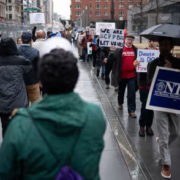The $20 Trillion Disaster? Why Experts Say a ‘Trumpcession’ is Unstoppable!
It’s happening again. The same hand-waving, jargon-laden reassurances from the financial elite that everything is fine—until it isn’t. Michael Burry and Jeremy Grantham, two of the most prominent doom prophets in finance, have been sounding alarms for years. Now, with the Atlanta Federal Reserve’s GDPNow model swinging from an expected 2.3% growth to a 2.8% contraction, their predictions of an imminent downturn—dubbed the “Trumpcession”—look increasingly less like hyperbole and more like inevitability.
Economic Contraction: The Numbers Don’t Lie
The Atlanta Fed doesn’t throw numbers around for fun. When they slash their GDP forecast this dramatically, it means something is rotten in the state of our economy. The idea that we were cruising toward steady growth has been shattered. A 2.8% contraction isn’t a blip—it’s a red flag waving frantically in front of investors, businesses, and anyone still clinging to the hope that we’re in for a soft landing.
A contracting economy paired with skyrocketing debt is the kind of toxic cocktail that sends markets into freefall. When consumer confidence drops, companies tighten spending, hiring slows, and the downward spiral accelerates.
Inflation: The Monster That Won’t Die
Meanwhile, inflation has reared its ugly head again, rising to 3% in January—just enough to remind Americans that their paychecks don’t stretch as far as they used to. Everything from groceries to gas remains stubbornly expensive, and any claims of “cooling inflation” feel like a cruel joke.
The Federal Reserve’s rate hikes were supposed to slay this inflation beast, but instead, we’re watching a bizarre economic horror film unfold: Higher borrowing costs, shrinking growth, and prices that refuse to budge. Stagflation, anyone?
The Usual Suspects: Tariffs, Trade Wars, and Global Mayhem
If you ask the experts—people like Jeremy Siegel and Bill Gross—why the economy is teetering, they’ll point to a mix of protectionist trade policies, geopolitical uncertainty, and incompetent leadership across the board. Here’s what’s fueling the fire:
Tariffs and Trade Wars: The belief that America can slap tariffs on everything without consequences is a dangerous myth. These trade barriers are jacking up costs for businesses and consumers while disrupting global supply chains. The real losers? Small businesses and working-class families who feel the price hikes first.
Geopolitical Chaos: The world isn’t exactly helping. U.S.-China relations remain icy, while conflicts in the Middle East and Eastern Europe keep markets on edge. Investors aren’t just worried about the economy—they’re worried about a system that seems increasingly unstable and unpredictable.
Banking System on Edge: Rising interest rates are pushing banks to the brink. We’ve already seen cracks appear with regional bank failures, and if liquidity dries up further, expect more dominoes to fall.
A Crisis of Our Own Making?
Enter the term “Trumpcession”—a loaded phrase that critics use to tie the current economic mess back to the policies of Donald Trump’s tenure. Whether it’s deregulation, ballooning deficits, or erratic tariff decisions, skeptics argue that we’re seeing the delayed consequences of economic recklessness. On the other side, Trump’s supporters claim his policies laid the groundwork for resilience, and that the downturn is more about mismanagement by current leadership than a direct consequence of his administration.
One thing is for sure: The economy is in the crosshairs, and someone is going to take the blame.
What Comes Next? Buckle Up.
The Federal Reserve is now faced with a brutal choice:
- Cut rates and risk reigniting inflation
- Keep rates high and risk deepening the economic downturn
Neither option is pretty, and the pain isn’t over. Investors are bracing for a turbulent ride, and policymakers are running out of tricks to keep the illusion of stability alive.
Here’s What to Watch:
- Job Growth: If hiring slows or layoffs accelerate, expect consumer spending to tank.
- Corporate Earnings: Weak reports from major companies signal a deeper recession ahead.
- Stock Market Volatility: The markets hate uncertainty, and there’s plenty of it.
Final Thought: The Reckoning is Here
The market isn’t some self-correcting machine—it’s a battlefield where speculation, policy failures, and corporate greed collide. And as we head into the next phase of this economic saga, the question isn’t whether a recession is coming—it’s how bad it’s going to get.
Stay informed. Stay cautious. And above all—buckle up.







Leave a Reply
Want to join the discussion?Feel free to contribute!